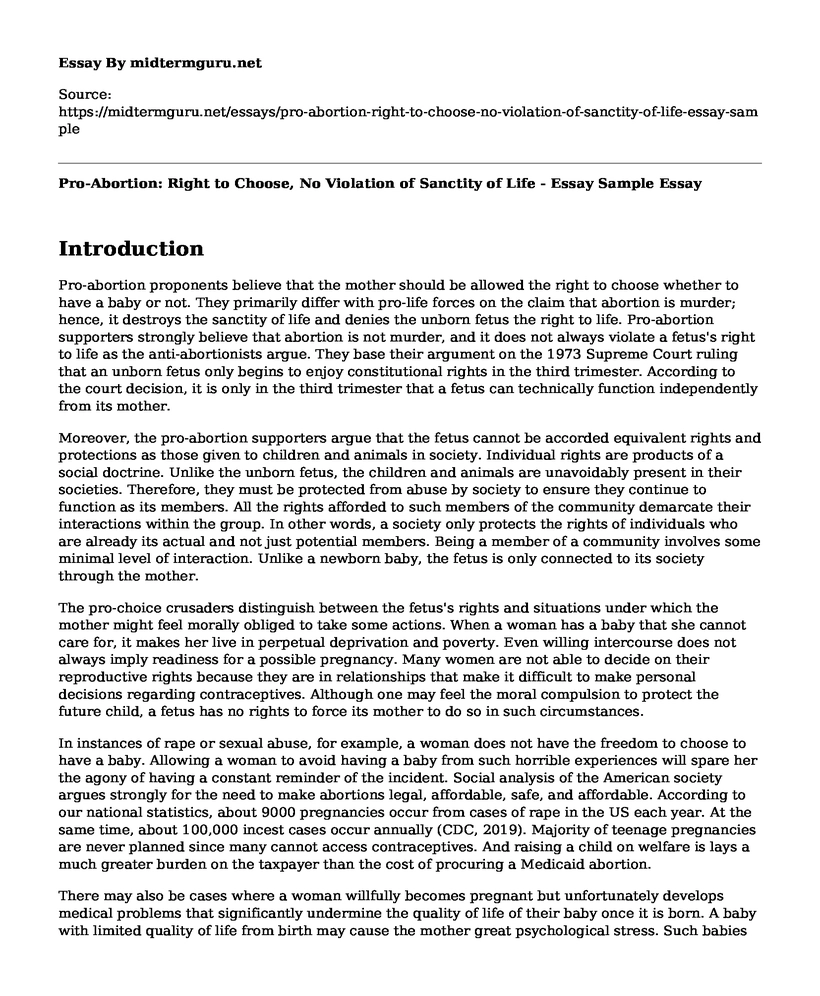Introduction
Pro-abortion proponents believe that the mother should be allowed the right to choose whether to have a baby or not. They primarily differ with pro-life forces on the claim that abortion is murder; hence, it destroys the sanctity of life and denies the unborn fetus the right to life. Pro-abortion supporters strongly believe that abortion is not murder, and it does not always violate a fetus's right to life as the anti-abortionists argue. They base their argument on the 1973 Supreme Court ruling that an unborn fetus only begins to enjoy constitutional rights in the third trimester. According to the court decision, it is only in the third trimester that a fetus can technically function independently from its mother.
Moreover, the pro-abortion supporters argue that the fetus cannot be accorded equivalent rights and protections as those given to children and animals in society. Individual rights are products of a social doctrine. Unlike the unborn fetus, the children and animals are unavoidably present in their societies. Therefore, they must be protected from abuse by society to ensure they continue to function as its members. All the rights afforded to such members of the community demarcate their interactions within the group. In other words, a society only protects the rights of individuals who are already its actual and not just potential members. Being a member of a community involves some minimal level of interaction. Unlike a newborn baby, the fetus is only connected to its society through the mother.
The pro-choice crusaders distinguish between the fetus's rights and situations under which the mother might feel morally obliged to take some actions. When a woman has a baby that she cannot care for, it makes her live in perpetual deprivation and poverty. Even willing intercourse does not always imply readiness for a possible pregnancy. Many women are not able to decide on their reproductive rights because they are in relationships that make it difficult to make personal decisions regarding contraceptives. Although one may feel the moral compulsion to protect the future child, a fetus has no rights to force its mother to do so in such circumstances.
In instances of rape or sexual abuse, for example, a woman does not have the freedom to choose to have a baby. Allowing a woman to avoid having a baby from such horrible experiences will spare her the agony of having a constant reminder of the incident. Social analysis of the American society argues strongly for the need to make abortions legal, affordable, safe, and affordable. According to our national statistics, about 9000 pregnancies occur from cases of rape in the US each year. At the same time, about 100,000 incest cases occur annually (CDC, 2019). Majority of teenage pregnancies are never planned since many cannot access contraceptives. And raising a child on welfare is lays a much greater burden on the taxpayer than the cost of procuring a Medicaid abortion.
There may also be cases where a woman willfully becomes pregnant but unfortunately develops medical problems that significantly undermine the quality of life of their baby once it is born. A baby with limited quality of life from birth may cause the mother great psychological stress. Such babies also have more demanding upbringing than normal babies. Also, in some cases, the medical problem may endanger the life of the mother, putting the safety of the fetus in line. In recognition of this fact, the 1973 Supreme Court ruling allowed for medical abortion is "medically necessary" cases where keeping the pregnancy would lead to long-lasting psychological and physical damage to the health of the mother.
Lastly, pro-choice supporters and opposers have converging thoughts regarding sacrificing a fetus's life in case the mother's life is in danger. This exception disqualifies the pro-life argument the mother and the fetus are distinct individuals. It also defeats the logic behind the claim that abortion denies the fetus the right to life. If it were so, then no case on earth should be able to warrant an abortion.
References
CDC. (2019, February 28). Understanding Pregnancy Resulting from Rape in the United States. Retrieved from https://www.cdc.gov/violenceprevention/datasources/nisvs/understanding-RRP-inUS.html
Cite this page
Pro-Abortion: Right to Choose, No Violation of Sanctity of Life - Essay Sample. (2023, Feb 01). Retrieved from https://midtermguru.com/essays/pro-abortion-right-to-choose-no-violation-of-sanctity-of-life-essay-sample
If you are the original author of this essay and no longer wish to have it published on the midtermguru.com website, please click below to request its removal:
- Essay on Rethinking of the Euthanasia Controversy
- Distinct Characteristics of Nursing - Paper Example
- Essay Sample on Mass Shooting at School in the United States
- Reasons Behind English Colonization in 17th Century - Essay Sample
- Americans Without Private Insurance: A Struggle for Healthcare Access - Essay Sample
- The President: Head of Government & State of USA & More - Essay Sample
- Disability Service Providers: A History of Successful Support Services - Essay Sample







